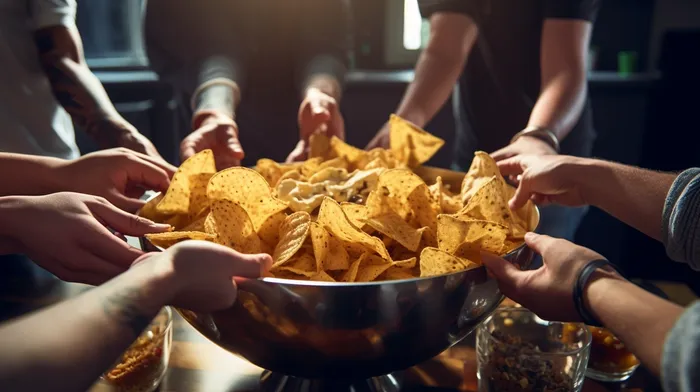Super Bowl Sunday is synonymous with parties, friends, and unhealthy foods. While this is a time of celebration for many, it can be a dangerous moment for those on a weight-loss journey. Before giving in to the temptation of junk food, it may be crucial to question our motivations behind such choices.
Researchers from Case Western Reserve University found that individuals who are people-pleasers tend to overeat at events like Super Bowl parties. Such behavior may stem from not wanting to cause any disturbance or upset the sense of social harmony, according to Julie Exline, a lead author of the study. She also mentioned that those who overeat to appease others often end up regretting their choices later, adding that “it doesn’t feel good to give in to social pressures.”
In the study, researchers asked participants to take a personality assessment quiz before placing them in a social situation where food was present. Those who scored high in “people-pleasing” categories on the quiz were found to eat more food.
Dangers of people-pleasing
Being a people-pleaser is not just a threat to one’s weight-loss goals but can also have significant negative impacts on mental health. People-pleasers often feel a strong need to avoid confrontation or disapproval, often leading them to disregard their personal feelings. This can result in them experiencing low self-esteem, anxiety, resentment, and even depression.
Taking charge of your choices
If you suspect that your desire to satisfy others is affecting your eating habits and mental well-being, it’s crucial to take charge of your choices. Here are some tips to help you stand up for yourself and make healthier decisions at social gatherings:
- Set boundaries: Establishing personal limits and communicating them to others is essential to maintaining your mental and physical well-being. Be clear about your dietary requirements or preferences and don’t be afraid to say “no” when offered something that goes against them.
-
Bring your own dish: One way to ensure you stay on track with your nutritional goals is to prepare a healthy dish to share at the party. This allows you to control the ingredients, portions, and nutritional value of what you’re eating while still participating in the social aspect of sharing food.
-
Focus on the conversation: Instead of placing your full attention on the food, engage in conversations with the people around you. By doing so, both you and your fellow partygoers will be more focused on the company and less on overeating.
-
Be mindful of triggers: Recognize situations that may trigger people-pleasing behaviors and be prepared to handle them in a way that respects your personal boundaries. If, for example, you know that sitting next to the snack table puts you in a position to appease others with your eating habits, choose a seat farther away from it.
-
Self-compassion: Lastly, don’t be too hard on yourself if you occasionally slip up. Remember that maintaining a healthy lifestyle is an ongoing process, and it’s essential to prioritize self-compassion and self-care.
By understanding and confronting the underlying motivations for your eating habits—particularly in social settings—it’s possible to make healthier choices and prioritize your well-being. No one should feel pressured to sacrifice their health to maintain social harmony. So, the next time you’re at a gathering, remember that the key to being less obese might be in being more assertive.



